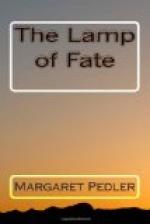Catherine had long been anxious to enter a community, restrained from doing so solely by Hugh’s need of her as mistress of his house, and now that her wish was an accomplished fact, it seemed as though he were spurred on to increasing effort by the example of his sister’s renunciation of the world. He withdrew himself even more completely from his wife, sometimes avoiding her company for days at a time, and adopted a stringently ascetic mode of life, denying himself all pleasure, fasting frequently, and praying and meditating for hours at a stretch in the private chapel which was attached to Coverdale. As far as it was possible, without actually entering a community, his existence resembled that of a monk, and Diane came to believe that he had voluntarily vowed himself to a certain form of penance and expiation for the marriage which the bigotry of his nature had led him to regard as a sin.
His life only impinged upon his wife’s in so far as the upbringing of their child was concerned. He was unnecessarily severe with her, and, since Diane opposed his strict ruling at every opportunity, Magda’s early life was passed in an atmosphere of fierce contradictions.
The child inherited her mother’s beauty to the full, and, as she developed, exhibited an extraordinary faculty for getting her own way. Servants, playmates, and governesses all succumbed to the nameless charm she possessed, while her mother and old Virginie frankly worshipped her.
The love of dancing was instinctive with her, and this, unknown to Hugh, her mother cultivated assiduously, fostering in her everything that was imaginative and delicately fanciful. Magda believed firmly in the existence of fairies and regarded flowers as each possessed of a separate entity with personal characteristics of its own. The originality of the dances she invented for her own amusement was the outcome.
But, side by side with this love of all that was beautiful, she absorbed from her mother a certain sophisticated understanding of life which was somewhat startling in one of her tender years, and this, too, betrayed itself in her dancing. For it is an immutable law that everything—good, bad, and indifferent—which lies in the soul of an artist ultimately reveals itself in his work.
And Magda, inheriting the underlying ardour of her father’s temperament and the gutter-child’s sharp sense of values which was her mother’s Latin Quarter garnering, at the age of eight danced, with all the beguilement and seductiveness of a trained and experienced dancer.
Even Hugh himself was not proof against the elusive lure of it. He chanced upon her one day, dancing in her nursery, and was so carried away by the charm of the performance that for the moment he forgot that she was transgressing one of his most rigid rules.
In the child’s gracious, alluring gestures he was reminded of the first time that he had seen her mother dance, and of how it had thrilled him. Beneath the veneer with which his self-enforced austerity had overlaid his emotions, he felt his pulses leap, and was bitterly chagrined at being thus attracted.




